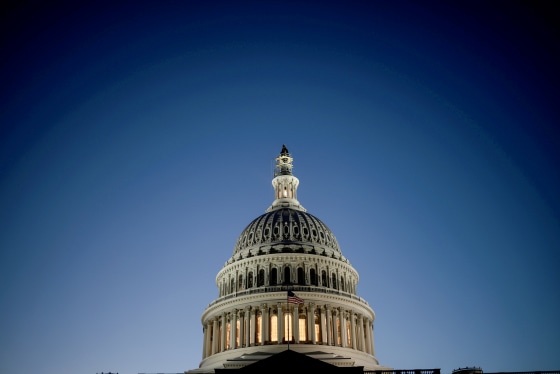WASHINGTON — The House Ways and Means Committee voted 40-3 on Friday to approve a bipartisan tax package that includes an expansion of the child tax credit and a series of breaks for businesses, sending it to the full chamber with momentum.
The panel’s vote on the $78 billion bill comes as the Republican-led House leaves for a one-week recess. But lawmakers are hopeful that the chamber will vote on it as early as the following week, which coincides with the beginning of tax filing season.
Republican sources said the bill is expected to hit the House floor the week of Jan. 29, when the House returns. One lawmaker said they believe it will be on the House floor during the first few days of that week, potentially under “suspension,” a process that allows bills to be fast-tracked but requires a two-thirds majority to pass.
The office of Speaker Mike Johnson’s, R-La., noted that nothing has been decided yet, with a spokesperson saying only that the “Speaker’s office has not made any public statements on the bill.”
The bill is the product of a deal between House Ways and Means Chair Jason Smith, R-Mo., and Senate Finance Chair Ron Wyden, D-Ore., who announced it last week after months of negotiations.
“Today’s strong bipartisan vote in the Ways and Means Committee shows there is a path forward for Republicans and Democrats to come together and deliver tax relief for workers, families, farmers, and small businesses,” Smith said after the vote.
Still, the bill could face headwinds. Some Democrats have complained that the package is too tilted toward business and that the child tax credit expansion is insufficient, meaning the party may be split on the floor. The three opponents of the measure in committee were all Democrats: Reps. Gwen Moore of Wisconsin, Lloyd Doggett of Texas, and Linda Sánchez of California.
The Wall Street Journal editorial board, which retains influence with big business-aligned Republicans, blasted the child tax credit provisions and lamented that the bill would “give Democrats a huge policy victory.” And the House Freedom Caucus, a group of ultraconservatives who wield outsize influence over Republican leadership, hasn’t taken a position yet.
But if it passes, the bill would represent a rare act of cross-party cooperation on a major issue in a divided Congress that has struggled to govern.
If the legislation clears the House, its path is hazier in the Senate, where it will require 60 votes and some senior members want to make revisions of their own.
Sen. Mike Crapo, of Idaho, the top Republican on the Finance Committee, said he’s not ready to support the package as-is and wants to amend it — either in committee or on the Senate floor.
“There are changes that are needed,” Crapo said in an interview. “I’m not discussing the substance of the negotiations, but there are changes that are needed, and I will work to see if we can get those changes made here.”
While some in the House have considered attaching it to an upcoming government funding bill, Crapo said he doesn’t believe that will happen. But he expects the House to move it quickly “and try to get the two-thirds vote the week after next.”
Rep. Richard Neal, of Massachusetts, the top Democrat on Ways and Means, said the legislation may yet be revised to accommodate Democrats who “want a more enhanced and robust child credit” and “to satisfy some qualms of Republicans in the Senate.”
But in another good sign for the bill, it received qualified praise from the White House and quickly won the endorsement of Senate Majority Leader Chuck Schumer, D-N.Y., who touted the child tax credit as a benefit to “as many as 16 million children in low-income households,” citing figures from an analysis by the liberal-leaning Center on Budget and Policy Priorities. Schumer also noted that the deal includes an expansion of low-income housing tax credit, which he said was his red-line demand to negotiators.
“I’m proud to support this bipartisan tax agreement because it will provide much-needed relief for low-income families and keep American businesses competitive against the Chinese Communist Party,” Schumer said Wednesday on the Senate floor.


